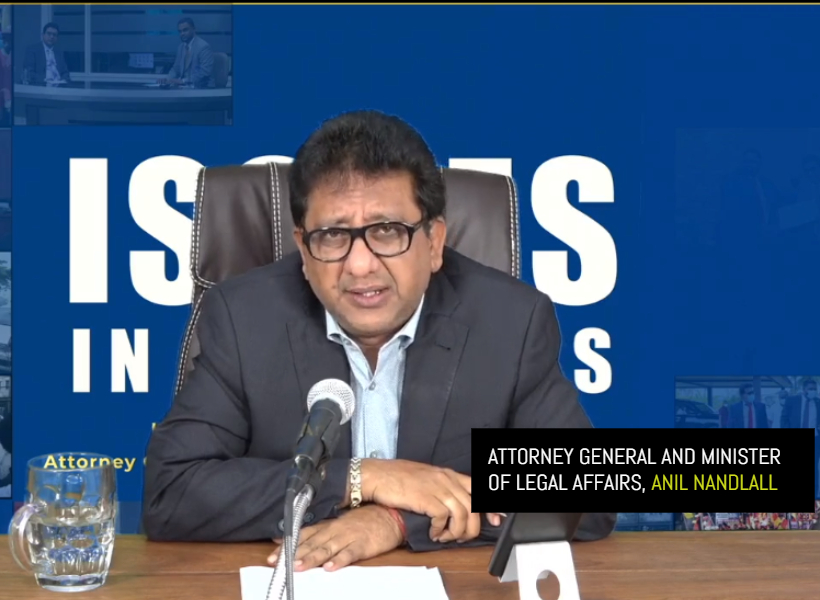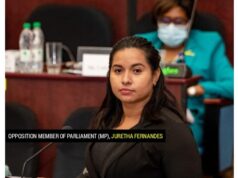The PPP/C Administration on Wednesday released its National Policy and Strategy for combating money laundering (ML), terrorism financing (TF), and proliferation financing (PF).
The five-year plan which spans from 2021 to 2025 aims to further enhance and improve Guyana’s anti-money laundering regime by addressing the risks identified in the nation’s second National Risk Assessment (NRA) Report.
In his explanatory memorandum, Minister of Legal Affairs and Attorney General, Anil Nandlall said Guyana like so many other countries throughout the world, faces ML/TF/PF risks. To determine/assess its level of risk, he noted that Guyana conducted two National ML/TF National Risk Assessment exercises between 2016 and 2021. Both NRA exercises were conducted with technical assistance and guidance from the World Bank.
During the most recent NRA exercise completed in July 2021, the working group of 70 organizations, in addition to assessing the country’s ML/TF risk, also examined the country’s ability to effectively combat proliferation financing, and illegal wildlife trade in Guyana. The working group also assessed the ML threats associated with the oil and gas sector, and financial inclusion products vulnerability.
According to the findings in the most recent NRA report, Guyana’s money laundering risk is stated as Medium High. In the same report, the country’s TF Risk was rated as MEDIUM. In relation to proliferation financing, the report concluded that much needs to be done at a country level to effectively combat proliferation financing as the legal framework in place for PF is inadequate and the relevant agencies lack the knowledge and skill to effectively combat same.
The ML risk associated with the illegal wildlife trade in Guyana was assessed as MEDIUM, while the ML threat associated with the oil and gas sector was considered as MEDIUM too.
It was also noted that Guyana is considered attractive to drug traffickers due to its porous borders and remote airstrips and ports which are poorly monitored due to the lack of resources and inaccessibility to those remote areas. Additionally, the country’s unpopulated forest and savannahs provide a safe haven for drug traffickers and smugglers. Also, Guyana’s proximity to Trinidad and Tobago increases its vulnerability to being misused given the history of Trinidad and Tobago nationals being linked or suspected of being linked to terrorism, terrorist organizations and the financing of terrorism.
Nandlall said, “We recognize that we cannot operate in a vacuum, and cooperation is important domestically and internationally, particularly with our regional counterparts where effective and timely information sharing can make a vast difference in the detection and prevention of all crime, more specifically, financial and organised crime.”
Additionally, he said the State recognizes that this National AML/CFT/PF Policy and Strategy can only be successful when linked to the strategic objectives of other important elements in the battle against money laundering, terrorist financing and proliferation financing. As a result, Nandlall said government has implemented measures to combat related and predicate criminal offences.
Significantly, he said these efforts have been recognized, resulting in Guyana enjoying improved rankings in international reports such as the United States’ Department of State International Narcotics Control Strategy Report (INCSR) and the Transparency International Corruption Index.
Similarly, Nandlall said Guyana has been removed from the European Union’s Blacklist on Taxation.
The AG said, “Over the years, we have taken steps to equip our citizens with AML knowledge through outreach programmes, not only in the main cities but in the interior regions, which have been met with great interest and appreciation.” By these measures and more to be conceived, designed and implemented, in the immediate and long-term future, he said the Government of Guyana demonstrably indicates an intolerance to criminal activities, and assures that the country’s systems and citizens will be protected from the ill effects of ML, TF and PF.
He said the current strategy provides a guide for the competent authorities, law enforcement authorities (LEAs), the judiciary, and supervisory authorities and the private sector, on the steps needed to further improve the country’s AML/CFT/PF systems through coordinated efforts.
“As we enter a period of renewed prosperity of Guyana, by the highly publicized discovery of offshore oil deposits, we commit further to becoming the new frontier of integrity, prudence, fortitude and commitment to the rule of law in the preservation of our resources, the protection of our citizens and the advancement of their welfare,” Nandlall concluded.











